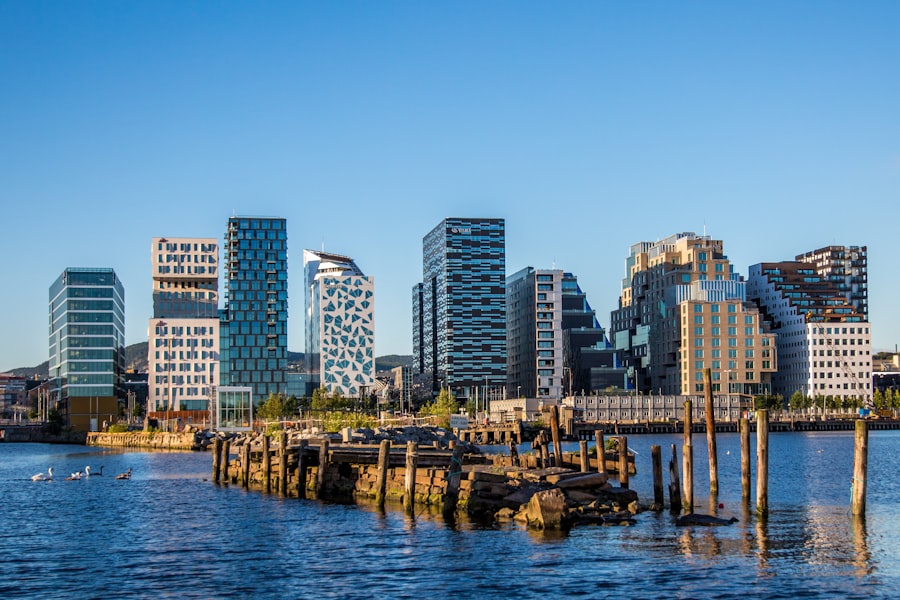The Norwegian education system is renowned for its emphasis on inclusivity, equality, and a holistic approach to learning. Education in Norway is compulsory for children aged six to sixteen, encompassing primary and lower secondary education. The structure is designed to foster not only academic skills but also social competencies, encouraging students to develop critical thinking and collaborative abilities.
The system is divided into three main levels: primary education (grunnskole), upper secondary education (videregående skole), and higher education, which includes universities and specialised institutions. One of the distinctive features of the Norwegian education system is its focus on student well-being and personal development. Schools are often characterised by a relaxed atmosphere where students are encouraged to express themselves freely.
This approach is rooted in the belief that a supportive environment enhances learning outcomes. Furthermore, the curriculum is designed to be flexible, allowing for adaptations based on individual student needs, which is particularly beneficial for international students who may require additional support in adjusting to a new educational context. Take the first step. Book a consultation with the Norway Relocation Group for your move to Norway.
Summary
- The Norwegian education system is known for its high quality and emphasis on student well-being and holistic development.
- When researching different international schools in Norway, it’s important to consider factors such as location, facilities, and accreditation.
- Considering the curriculum offered is crucial, as it can vary widely between schools and may impact a child’s educational experience.
- Evaluating the language of instruction is essential, as some international schools may offer bilingual or multilingual programs.
- Assessing the school’s location and facilities is important for ensuring a safe and conducive learning environment for students.
Researching Different International Schools in Norway
When considering an international education in Norway, it is essential to explore the various international schools available across the country. These institutions cater to expatriate families and local students seeking an international curriculum. Many of these schools offer programmes that align with global educational standards, such as the International Baccalaureate (IB) or the British curriculum, providing students with a pathway to universities worldwide.
Researching different international schools involves examining their philosophies, teaching methodologies, and the diversity of their student bodies. Each school has its unique character, influenced by its location, staff, and community engagement. It is advisable to visit school websites, read reviews from current and former students, and engage with parent forums to gather insights into the experiences of others.
This research will help families make informed decisions about which school aligns best with their educational values and aspirations for their children.
Considering the Curriculum Offered

The curriculum offered by international schools in Norway can vary significantly, making it a crucial factor in the decision-making process. Some schools may follow a specific national curriculum, while others adopt an international framework that prepares students for global citizenship. For instance, schools offering the IB programme focus on developing critical thinking skills and intercultural understanding through a rigorous academic framework.
In addition to traditional subjects such as mathematics, science, and languages, many international schools incorporate creative arts, physical education, and social studies into their curricula. This well-rounded approach not only nurtures academic excellence but also encourages personal growth and social responsibility. Parents should consider their child’s interests and strengths when evaluating the curriculum, ensuring that it aligns with their educational goals and aspirations.
Evaluating the Language of Instruction
The language of instruction is another vital consideration when selecting an international school in Norway. While many international schools offer instruction in English, some may provide bilingual education or instruction in other languages, such as French or German. Understanding the language of instruction is essential for ensuring that students can fully engage with the curriculum and communicate effectively with their peers and teachers.
For non-native speakers, it is important to assess the school’s language support services. Many international schools offer English as an Additional Language (EAL) programmes to help students improve their language skills and integrate smoothly into the school community. Additionally, some schools may offer Norwegian language classes to help students acclimatise to their new environment and culture.
Evaluating these language support options will help parents determine whether a school can adequately meet their child’s linguistic needs.
Assessing the School’s Location and Facilities
The location of an international school can significantly impact a student’s experience. Proximity to home can reduce travel time and enhance convenience for families. Moreover, schools situated in vibrant urban areas may offer additional opportunities for cultural engagement and extracurricular activities.
Conversely, schools located in quieter suburban settings may provide a more tranquil environment conducive to focused learning. Facilities also play a crucial role in the overall educational experience. Modern classrooms equipped with technology, libraries stocked with diverse resources, and recreational areas for sports and arts can greatly enhance student engagement and learning outcomes.
Parents should consider visiting potential schools to assess their facilities firsthand and determine whether they meet their expectations for a conducive learning environment.
Examining the School’s Accreditation and Reputation

Accreditation is an important indicator of a school’s quality and adherence to educational standards. International schools in Norway may be accredited by various organisations, such as the Council of International Schools (CIS) or the International Baccalaureate Organisation (IBO). Accreditation ensures that schools meet specific criteria regarding curriculum quality, teaching standards, and student support services.
In addition to accreditation, researching a school’s reputation within the community can provide valuable insights into its performance and culture. Speaking with current students, parents, and alumni can help gauge the school’s strengths and weaknesses. Online reviews and rankings can also offer perspectives on academic achievements and overall satisfaction among families.
A school’s reputation can significantly influence a student’s experience and future opportunities.
Understanding the Admission Process and Requirements
Navigating the admission process for international schools in Norway can be complex, as each institution may have its own set of requirements and procedures. Generally, prospective students must submit an application form along with supporting documents such as academic records, letters of recommendation, and proof of residency or visa status. Some schools may also require entrance assessments or interviews as part of their selection process.
It is essential for families to be aware of application deadlines and any specific criteria that may apply to their child’s age group or educational background. Early preparation can alleviate stress during this process, allowing families to gather necessary documentation and ensure that they meet all requirements in a timely manner. Understanding the admission process will help families navigate this critical step towards securing a place at their desired school.
Considering Extracurricular Activities and Support Services
Extracurricular activities play a significant role in enriching a student’s educational experience beyond academics. Many international schools in Norway offer a wide range of clubs, sports teams, arts programmes, and community service opportunities that encourage students to explore their interests and develop new skills. Participation in these activities can foster friendships, enhance teamwork abilities, and promote personal growth.
Support services are equally important for ensuring that students thrive in their new environment. Many international schools provide counselling services, academic support programmes, and resources for students with special educational needs. These services can be invaluable for helping students navigate challenges related to adjusting to a new culture or managing academic pressures.
Families should inquire about the availability of these support services when evaluating potential schools.
Exploring the School’s Diversity and Inclusivity
Diversity and inclusivity are fundamental aspects of many international schools in Norway. These institutions often celebrate multiculturalism by welcoming students from various backgrounds, fostering an environment where different perspectives are valued and respected. A diverse student body can enrich classroom discussions and promote understanding among peers.
When assessing a school’s commitment to inclusivity, families should consider how well the institution supports students from different cultural backgrounds, including language assistance programmes and cultural awareness initiatives. Schools that prioritise inclusivity create a sense of belonging for all students, which can significantly enhance their overall educational experience.
Evaluating the Cost and Financial Aid Options
The cost of tuition at international schools in Norway can vary widely depending on factors such as location, facilities, and curriculum offered. Families should carefully evaluate their budget when considering different schools, taking into account not only tuition fees but also additional costs such as uniforms, textbooks, and extracurricular activities. Many international schools offer financial aid options or scholarships to assist families who may require support in covering tuition costs.
It is advisable for families to inquire about these options during the application process to determine whether they qualify for any financial assistance. Understanding the financial implications will help families make informed decisions about their child’s education.
Visiting the School and Meeting with Staff and Students
Finally, one of the most effective ways to gauge whether an international school is the right fit for your child is by visiting the campus and meeting with staff members and current students. School tours provide an opportunity to observe the learning environment firsthand, allowing families to assess facilities, classroom dynamics, and overall atmosphere. Engaging with teachers can offer valuable insights into their teaching philosophies and approaches to student support.
Additionally, speaking with current students can provide a glimpse into daily life at the school, including social interactions and extracurricular involvement. These interactions can help families make a well-rounded decision about which school will best meet their child’s needs. In conclusion, choosing an international school in Norway requires careful consideration of various factors including curriculum offerings, language of instruction, location, accreditation, admission processes, extracurricular activities, diversity initiatives, financial implications, and personal visits.
For those interested in learning Norwegian alongside their studies or as part of their integration into Norwegian society, NLS Norwegian Language School in Oslo offers exceptional courses tailored for all levels of proficiency. Their dedicated instructors provide immersive language experiences that not only teach grammar but also cultural nuances essential for effective communication in Norway. By enrolling in NLS courses, students can enhance their educational journey while gaining valuable language skills that will serve them well both academically and socially in their new environment.
Learn more about the Norwegian classes at the NLS Norwegian Language School in Oslo

